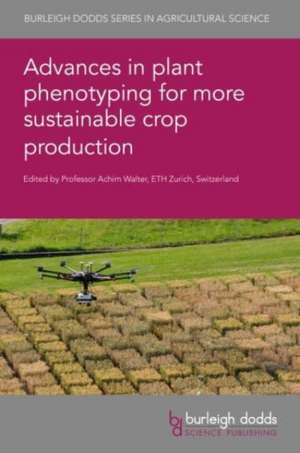Advances in Plant Phenotyping for More Sustainable Crop Production: Burleigh Dodds Series in Agricultural Science
en Limba Engleză Hardback – 18 apr 2022
Din seria Burleigh Dodds Series in Agricultural Science
- 14%
 Preț: 1188.32 lei
Preț: 1188.32 lei - 14%
 Preț: 1150.57 lei
Preț: 1150.57 lei - 14%
 Preț: 1045.00 lei
Preț: 1045.00 lei - 14%
 Preț: 1223.46 lei
Preț: 1223.46 lei - 14%
 Preț: 1517.61 lei
Preț: 1517.61 lei - 14%
 Preț: 1299.23 lei
Preț: 1299.23 lei - 14%
 Preț: 939.17 lei
Preț: 939.17 lei - 14%
 Preț: 1085.11 lei
Preț: 1085.11 lei - 14%
 Preț: 996.62 lei
Preț: 996.62 lei - 14%
 Preț: 1304.53 lei
Preț: 1304.53 lei - 14%
 Preț: 995.59 lei
Preț: 995.59 lei - 14%
 Preț: 1521.11 lei
Preț: 1521.11 lei - 14%
 Preț: 1353.64 lei
Preț: 1353.64 lei - 14%
 Preț: 1304.53 lei
Preț: 1304.53 lei - 14%
 Preț: 1160.59 lei
Preț: 1160.59 lei - 14%
 Preț: 1373.34 lei
Preț: 1373.34 lei - 14%
 Preț: 944.83 lei
Preț: 944.83 lei - 14%
 Preț: 1222.96 lei
Preț: 1222.96 lei - 14%
 Preț: 996.11 lei
Preț: 996.11 lei - 14%
 Preț: 1091.76 lei
Preț: 1091.76 lei - 14%
 Preț: 997.42 lei
Preț: 997.42 lei - 14%
 Preț: 1083.80 lei
Preț: 1083.80 lei - 14%
 Preț: 1359.95 lei
Preț: 1359.95 lei - 14%
 Preț: 1577.88 lei
Preț: 1577.88 lei - 14%
 Preț: 1353.17 lei
Preț: 1353.17 lei - 14%
 Preț: 1216.82 lei
Preț: 1216.82 lei - 14%
 Preț: 1296.75 lei
Preț: 1296.75 lei - 14%
 Preț: 940.01 lei
Preț: 940.01 lei - 14%
 Preț: 1652.00 lei
Preț: 1652.00 lei - 14%
 Preț: 1434.08 lei
Preț: 1434.08 lei - 14%
 Preț: 1427.44 lei
Preț: 1427.44 lei - 14%
 Preț: 1572.41 lei
Preț: 1572.41 lei - 14%
 Preț: 1082.48 lei
Preț: 1082.48 lei - 14%
 Preț: 1527.25 lei
Preț: 1527.25 lei - 14%
 Preț: 1374.33 lei
Preț: 1374.33 lei - 14%
 Preț: 1652.00 lei
Preț: 1652.00 lei - 14%
 Preț: 1304.86 lei
Preț: 1304.86 lei - 14%
 Preț: 1079.17 lei
Preț: 1079.17 lei - 14%
 Preț: 1310.15 lei
Preț: 1310.15 lei - 14%
 Preț: 1159.57 lei
Preț: 1159.57 lei - 14%
 Preț: 1534.19 lei
Preț: 1534.19 lei - 14%
 Preț: 1079.51 lei
Preț: 1079.51 lei - 14%
 Preț: 1542.61 lei
Preț: 1542.61 lei - 14%
 Preț: 1300.74 lei
Preț: 1300.74 lei - 14%
 Preț: 1305.70 lei
Preț: 1305.70 lei - 14%
 Preț: 1161.07 lei
Preț: 1161.07 lei - 14%
 Preț: 1301.07 lei
Preț: 1301.07 lei - 14%
 Preț: 1164.06 lei
Preț: 1164.06 lei - 14%
 Preț: 1354.99 lei
Preț: 1354.99 lei - 14%
 Preț: 1080.16 lei
Preț: 1080.16 lei
Preț: 1082.15 lei
Preț vechi: 1258.32 lei
-14% Nou
Puncte Express: 1623
Preț estimativ în valută:
207.07€ • 216.74$ • 172.35£
207.07€ • 216.74$ • 172.35£
Carte tipărită la comandă
Livrare economică 31 martie-14 aprilie
Preluare comenzi: 021 569.72.76
Specificații
ISBN-13: 9781786768568
ISBN-10: 1786768569
Pagini: 420
Dimensiuni: 152 x 229 x 24 mm
Greutate: 0.71 kg
Editura: Burleigh Dodds
Seria Burleigh Dodds Series in Agricultural Science
ISBN-10: 1786768569
Pagini: 420
Dimensiuni: 152 x 229 x 24 mm
Greutate: 0.71 kg
Editura: Burleigh Dodds
Seria Burleigh Dodds Series in Agricultural Science
Descriere
This collection reviews the wealth of research on advances in phenotyping and the influential role it plays in identifying the relative importance of genetic, environmental and agronomic factors in determining complex plant traits, such as yield and resource-use efficiency.
